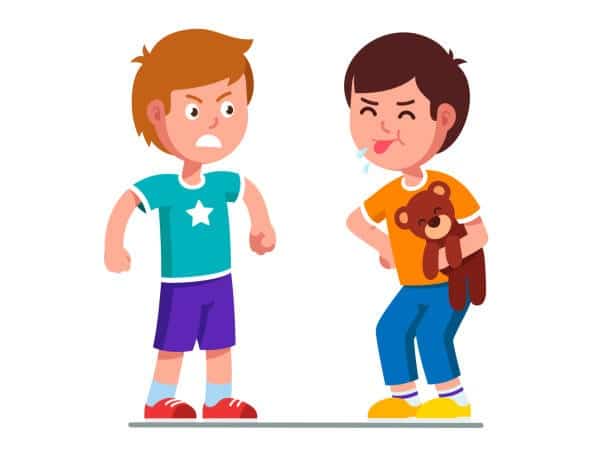When I was twenty-two years old, I wanted two things: 1. To be understood. 2. For people to think I was good at my job....Read more
Kids are still waiting to become so annoying. Recognizing that youngsters’ behavior can range significantly depending on the character, development degree, and occasion is vital. Whatever offends one man or woman can be preferred or tolerated with the aid of another. Age, surroundings, parenting, and social norms can affect kids’ behavior.
It is vital to approach this question know-how that youngsters learn and develop and that their conduct is a natural part of their development.

Being patient, know-how and supportive of kids at unique degrees of their adult lives is critical. Good steering, conversation, and compassion can move protractedly in constructing desirable relationships and cooperation with children of every age.
Why are 8 year-olds so annoying
As a writer, I have to reiterate that it’s far neither fair nor beside the point to universally label any specific organization, which includes eight-year-olds, as having “offensive” Children’s behavior may be encouraged through matters of sorts consisting of personal persona, family dynamics, and developmental tiers.
Remember, 8-year-olds are nevertheless mastering and developing. They can also exhibit behaviours that adults find difficult or frustrating, but it is critical that this is treated with empathy and know-how.
At age eight, kids often undergo principal cognitive, emotional, and social changes as they grow and discover the arena around them. They check boundaries, demand Attention, or try to assert their independence. This can, once in a while, cause behaviours that adults take into account.
It is critical to offer patience, wonderful steering and help as caregivers, parents, or adults in their lives. Open conversation and setting appropriate boundaries can assist children in studying suitable behaviours and coping techniques.
Rather than being labelled demanding, growing nurturing and understanding surroundings can assist in fostering healthy improvement and improve baby-adult relationships.
What is the most difficult age for the boy
The trouble of a specific age can vary substantially depending on a man’s or woman’s personality, family dynamics, and several external factors. There is no definitive answer to figuring out a single “tough” age, as demanding situations are at special levels of a toddler’s existence.

There may be times in an infant’s improvement that gift particular challenges. Example:
- Infancy. The first few months may be hard for parents as they cope with all the sleepless nights, feeding schedules, and newborn care.
- Childhood. The infant’s posture is characterized by way of fast exploration, assertiveness, and common temper tantrums, which can be difficult for the child and caregivers
- Adolescence. Adolescence brings hormonal adjustments, peer pressure, Instructional pressure and setting up a man or woman identification may be difficult for kids and their households.
Parents, guides and information play a crucial role in effectively supporting manual kids through those forms of issues.
Building robust and supportive relationships with open conversation could make dealing with those demanding situations extra possible and promote healthy improvement for youngsters as they develop into teenagers.
What is the most difficult age for a girl?
A specific age’s difficulty can vary greatly depending on a man or woman’s character, family dynamics, and numerous outside elements. There isn’t any definitive solution to figuring out a single “challenging” age, as demanding situations rise at extraordinary ranges in a toddler’s life.
There may be times in a baby’s development that gift unique challenges. Example:
- Infancy. The first few months can be challenging for parents as they address all of the sleepless nights, feeding schedules, and newborn care.
- Childhood. The toddler’s posture is characterized by rapid exploration, assertiveness, and common mood tantrums, which may be hard for the child and caregivers
- Adolescence. Adolescence brings hormonal changes, peer stress, instructional strain, and the method of establishing a character identity, which can be challenging for youngsters and their families.
Is it normal for a 5-year-old to be annoying?
Yes, it is flawlessly ordinary for a 5-year antique to showcase behaviours that some adults might find stressful. Children at this age are nonetheless inside the early tiers of improvement, and their conduct may be encouraged by means of a variety of factors, e.g.
- Curiosity and Exploration. Five-12 months-olds are eager to explore the arena around them, so they will need to ask extra questions or do things that adults might not forget repetitive or disturbing . . . .
- They are getting Attention. At this age, kids often require the eye of their caregivers and may resort to positive movements to reap their desires, even supposing it means being stressful.
- Emotional expression. Children won’t yet have completely evolved dynamic law capabilities, and their frustration or feelings may occasionally be expressed in ways that adults find disturbing.
- Test boundary. 5 year-olds learn about policies and barriers and can push boundaries or undertake autotest Boundaries. Five-city as a manner to understand how the arena works.
- They are imitating Others. Children regularly imitate behaviours they see in others, even adults, which could sometimes cause offensive conduct. It is critical to remember that these behaviours are regular for a five-12 months-antique and are a part of their natural improvement. Patience, knowledge, and precise steerage are needed while dealing with kids of this age.
Providing clear and steady boundaries as supervisors or managers and fostering communication can help shift those behaviours into high-quality and optimistic activities in addition to activities that empower them and attract their curiosity. With time and
guide, lots of these “annoying” behaviours will slowly diminish as the child continues to grow and broaden
What age are kids the nicest
It’s vital to consider that a kid’s behaviour can vary substantially based totally on
a person’s personality, circle of relatives dynamics, and numerous outside elements. There is no unique age at which all children are universally the nicest.
Each child is precise and might display kindness and tremendous conduct at extraordinary stages in their improvement.so, there are certain age-associated traits in toddler development which could have an impact on their kindness and social interactions:
- Preschool Age (three-five years). Many youngsters at this age may be naturally kind and empathetic. They are often eager to make pals, proportion toys, and display affection.
- Elementary School Age (6-12 years). During this era, children maintain their social capabilities and empathy. They may also grow to be greater privy to the emotions of others and demonstrate kindness and compassion.
- Adolescence (thirteen-18 years). While young adults can now and then be misunderstood because of hormonal changes and social pressures, many teens also display kindness, empathy, and a willingness to assist others.
It’s crucial to nurture and inspire kindness in youngsters throughout their lives. Parents, caregivers, and educators play a vital function in modelling positive conduct, fostering empathy, and offering youngsters opportunities to practice acts of kindness and compassion.
So the age at which kids are the nicest can range for each baby. By imparting a supportive and concerned environment, we can assist kids in broadening and maintaining fantastic and kind behaviours throughout their lives.
What are the causes of children’s annoyance?
Children’s annoyance may be attributed to various factors, and understanding those causes are important for imparting suitable aid and steerage. Some commonplace reasons for kid’s annoyance include:
- Developmental Stage. Children undergo exceptional developmental stages, each with its own set of challenges. For instance, at some locations in the toddler and preschool years, they may show clingy or demanding behaviours as they discover their independence and assert themselves.
- Emotional Expression. Children may not have completely evolved emotional regulation skills, leading them to express frustration, anger, or other feelings in approaches that adults might find demanding.
- Attention-seeking Behavior. Children regularly look for Attention from adults and can resort to worrying behaviours to get observed or engage in interactions.
- Fatigue or Hunger. When kids are worn-out or hungry, they will turn out to be more irritable and susceptible to displaying demanding behaviours.
- Environmental Factors. Stressful or unexpected situations, modifications in workouts, or disruptions within the infant’s surroundings can contribute to annoyance or irritability.
- Social Interactions. Difficulties in social interactions with friends or siblings can cause frustration and, in flip, demanding behaviour.
- Modelling Behavior. Children often mimic the conduct they have a look at in adults or older siblings. If they witness others undertaking disturbing movements, they may imitate those behaviours.
- Lack of Language Skills. Younger kids who are growing language competencies may also resort to whining or tantrums to speak their wishes or emotions.
- Testing Boundaries. As a part of their natural development, kids take a look at barriers to recognize the policies and limits s
How do you tolerate annoying kids?
Tolerating worrying behaviour from kids requires endurance, knowledge, and a compassionate technique. Here are some techniques to help you take care of stressful behaviour in a nice way:
- Maintain Perspective. Remember that youngsters are nevertheless studying and growing. Their demanding conduct is usually a result of their curiosity, feelings, or desire for interest. Recognizing that these behaviours are common for their age will let you empathize with the scenario.
- Identify Triggers. Pay interest to what triggers the child’s demanding conduct. Are they in search of interest, hungry, tired, or dealing with a challenging state of affairs? Understanding the underlying reasons lets you deal with the basic reason.
- Set Clear Boundaries. Establish clear and consistent policies for behaviour. Children thrive with predictable expectations, and setting limitations can guide them in understanding what is acceptable.
- Redirect Behavior. When a baby’s conduct becomes demanding, gently redirect their interest to an extra suitable interest or high-quality interplay. Offer them alternatives that align with the policies and boundaries you have set.
Use Positive Reinforcement Praise and reward children once they display effective behavior. Positive reinforcement can encourage them to copy their behavior instead of resorting to worrying ones for Attention.
Engage the child in a laugh and optimistic activities that may channel their electricity and curiosity in an advantageous path.
What is the depleted mother syndrome?
There may be no identified medical or psychological circumstance called “depleted mom syndrome.” It is feasible that the period is probably used colloquially or informally to explain a mother’s feelings of exhaustion, emotional strain, or burnout as a consequence of the needs of parenting and caregiving obligations.
Parenting can be worthwhile, but it may also be bodily and emotionally taxing, particularly whilst mothers face a couple of obligations, including being concerned for kids, handling household tasks, and doubtlessly operating out of doors. This can result in feelings of depletion, overwhelm, and pressure.

Mothers may experience signs of fatigue, irritability, mood swings, dozing, and feeling crushed when handling “depleted mother syndrome.” It’s vital to say that feeling depleted or beaten as a figure is a not unusual pleasure and does no longer always suggest a clinical condition.
If a mother is suffering from stress, burnout, or feeling crushed, seeking assistance from family, buddies, or professional resources is critical. Talking openly approximately emotions and searching for assistance can result in strategies to manage stress, enhance self-care practices, and locate stability in the demanding role of parenting.

When I was twenty-two years old, I wanted two things: 1. To be understood. 2. For people to think I was good at my job. As a first time founder, I remember feeling under-qualified. I felt like an impostor—and it showed. I struggled to communicate my value in a way that my colleagues and potential investors could understand. I realized I needed to clarify my message and use social media as a tool to help me build my personal brand. This would help me look more credible, I thought. So I got to work. I updated my social media profiles, built a personal website, and began sharing my story online. The more content I shared, the more confident I became. And the more confident I became, the more credible I appeared. Now i am writing blogs for madeforkids.co.uk on different topics on kids.
- Latest Posts by Anna Vatuone
-
What Are The Uses Of A Drone
- -
What Are The Uses Of Playhouse
- -
How To Get A Child To Warm Up To You
- All Posts
